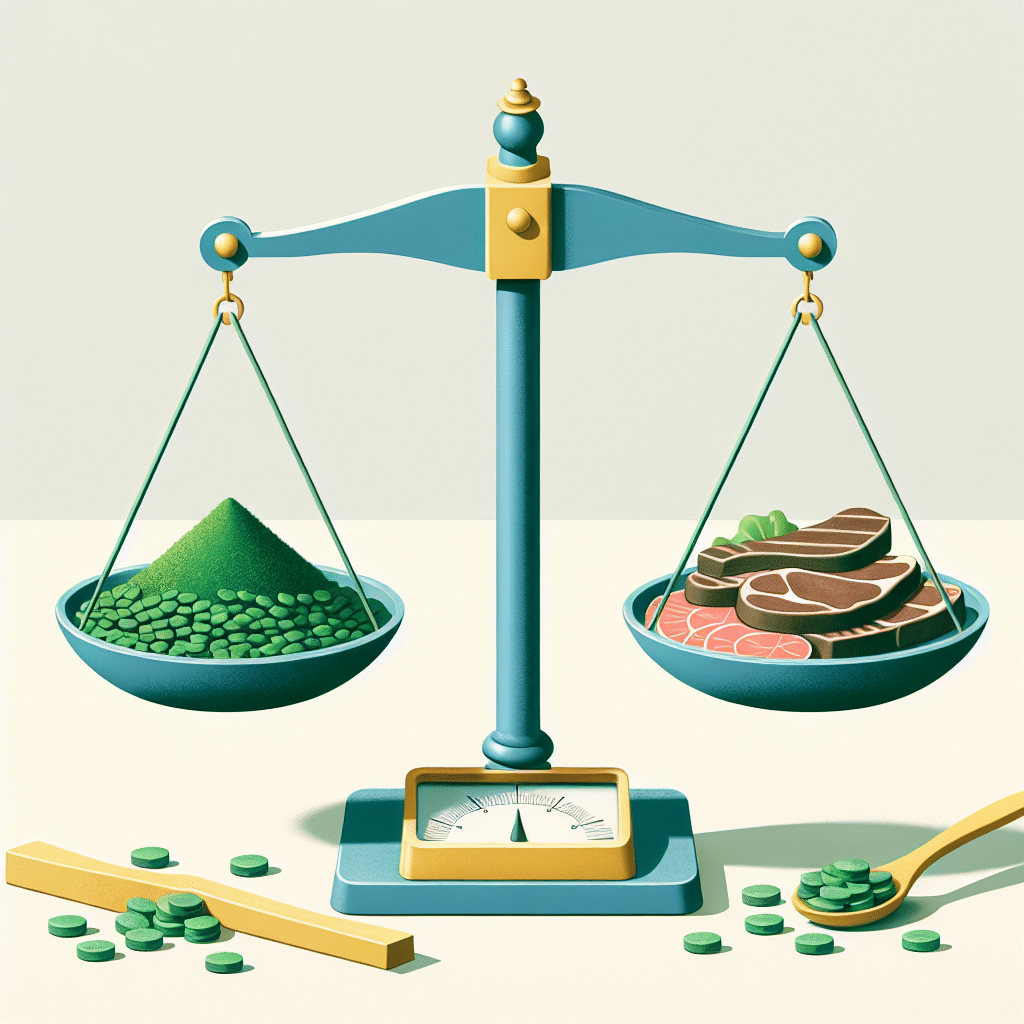Is Spirulina Better Than Meat?
-
Table of Contents
- Spirulina vs. Meat: Evaluating Nutritional Benefits and Sustainability
- Understanding Spirulina
- Nutritional Showdown: Spirulina vs. Meat
- Environmental Impact: A Critical Comparison
- Health Benefits and Potential Risks
- Case Studies and Statistics
- Conclusion: Is Spirulina Better Than Meat?
- Discover ETprotein’s High-Quality Protein Products
Spirulina vs. Meat: Evaluating Nutritional Benefits and Sustainability

In the quest for optimal nutrition and environmental sustainability, the debate between traditional sources of protein, such as meat, and alternative sources, like spirulina, has become increasingly relevant. This article delves into the nutritional comparison between spirulina and meat, their environmental impacts, and the potential health benefits and drawbacks of each.
Understanding Spirulina
Spirulina is a blue-green algae that has been consumed for centuries due to its high nutrient content. It is often sold in powder form and can be added to smoothies, juices, or sprinkled on food. Spirulina is celebrated for its high protein content, vitamins, minerals, and antioxidants.
Nutritional Showdown: Spirulina vs. Meat
When comparing spirulina to meat, it’s essential to consider several nutritional aspects:
- Protein Content: Spirulina contains about 60-70% protein by weight, which is comparable to the protein content in meat. However, the protein in spirulina is considered a complete protein, meaning it contains all essential amino acids.
- Vitamins and Minerals: Spirulina is rich in vitamins A, C, E, and B vitamins, including B12, which is often a concern for those following a plant-based diet. It also contains minerals such as iron, magnesium, and calcium. Meat also provides B vitamins and minerals but lacks the variety of antioxidants found in spirulina.
- Fats: Spirulina is low in fat, with a small amount of beneficial polyunsaturated fatty acids, including gamma-linolenic acid. Meat’s fat content varies but can include a higher proportion of saturated fats, which may contribute to heart disease.
Environmental Impact: A Critical Comparison
The production of spirulina has a significantly lower environmental footprint compared to meat production:
- Land Use: Spirulina cultivation requires far less land than livestock farming, reducing deforestation and habitat destruction.
- Water Usage: Spirulina farming is more water-efficient than meat production, which is one of the most water-intensive forms of agriculture.
- Greenhouse Gas Emissions: The livestock sector is a significant contributor to greenhouse gas emissions, whereas spirulina production emits minimal greenhouse gases.
Health Benefits and Potential Risks
Both spirulina and meat have their unique health benefits and potential risks:
- Health Benefits of Spirulina: Spirulina’s antioxidants, such as phycocyanin, may have anti-inflammatory properties. Its nutrient density can support immune function and overall health.
- Health Risks of Spirulina: Contaminated spirulina can contain harmful bacteria or heavy metals, so sourcing from reputable suppliers is crucial.
- Health Benefits of Meat: Meat is a source of high-quality protein and essential nutrients like iron and vitamin B12, which are crucial for health.
- Health Risks of Meat: Excessive consumption of red and processed meats has been linked to increased risks of heart disease, cancer, and other health issues.
Case Studies and Statistics
Several studies have highlighted the benefits of spirulina:
- A study published in the Journal of Applied Phycology found that spirulina supplementation improved the nutritional status of undernourished children.
- Research in the European Review for Medical and Pharmacological Sciences showed that spirulina could help reduce blood pressure and cholesterol levels.
Conversely, the World Health Organization has classified processed meats as carcinogenic and red meats as probably carcinogenic to humans, based on evidence from hundreds of studies.
Conclusion: Is Spirulina Better Than Meat?
While spirulina offers a high-protein, nutrient-rich alternative to meat with a lower environmental impact, it is not a direct substitute in terms of taste and culinary uses. A balanced diet can include both spirulina and sustainably sourced meats, depending on individual dietary needs and preferences. Ultimately, incorporating a variety of protein sources is key to a healthy and environmentally conscious diet.
Discover ETprotein’s High-Quality Protein Products
If you’re looking to integrate high-quality protein into your diet, ETprotein offers a range of organic bulk vegan proteins that are an excellent addition to any health-conscious lifestyle. Their products, including spirulina, are characterized by a neutral taste, non-GMO, and allergen-free attributes, ensuring you receive the best in terms of both nutrition and quality.
About ETprotein:
ETprotein, a reputable protein and L-(+)-Ergothioneine (EGT) Chinese factory manufacturer and supplier, is renowned for producing, stocking, exporting, and delivering the highest quality organic bulk vegan proteins and L-(+)-Ergothioneine. They include Organic rice protein, clear rice protein, pea protein, clear pea protein, watermelon seed protein, pumpkin seed protein, sunflower seed protein, mung bean protein, peanut protein, and L-(+)-Ergothioneine EGT Pharmaceutical grade, L-(+)-Ergothioneine EGT food grade, L-(+)-Ergothioneine EGT cosmetic grade, L-(+)-Ergothioneine EGT reference grade and L-(+)-Ergothioneine EGT standard. Their offerings, characterized by a neutral taste, non-GMO, allergen-free attributes, with L-(+)-Ergothioneine purity over 98%, 99%, cater to a diverse range of industries. They serve nutraceutical, pharmaceutical, cosmeceutical, veterinary, as well as food and beverage finished product distributors, traders, and manufacturers across Europe, USA, Canada, Australia, Thailand, Japan, Korea, Brazil, and Chile, among others.
ETprotein specialization includes exporting and delivering tailor-made protein powder and finished nutritional supplements. Their extensive product range covers sectors like Food and Beverage, Sports Nutrition, Weight Management, Dietary Supplements, Health and Wellness Products, and Infant Formula, ensuring comprehensive solutions to meet all your protein needs.
As a trusted company by leading global food and beverage brands and Fortune 500 companies, ETprotein reinforces China’s reputation in the global arena. For more information or to sample their products, please contact them and email sales(at)ETprotein.com today.












